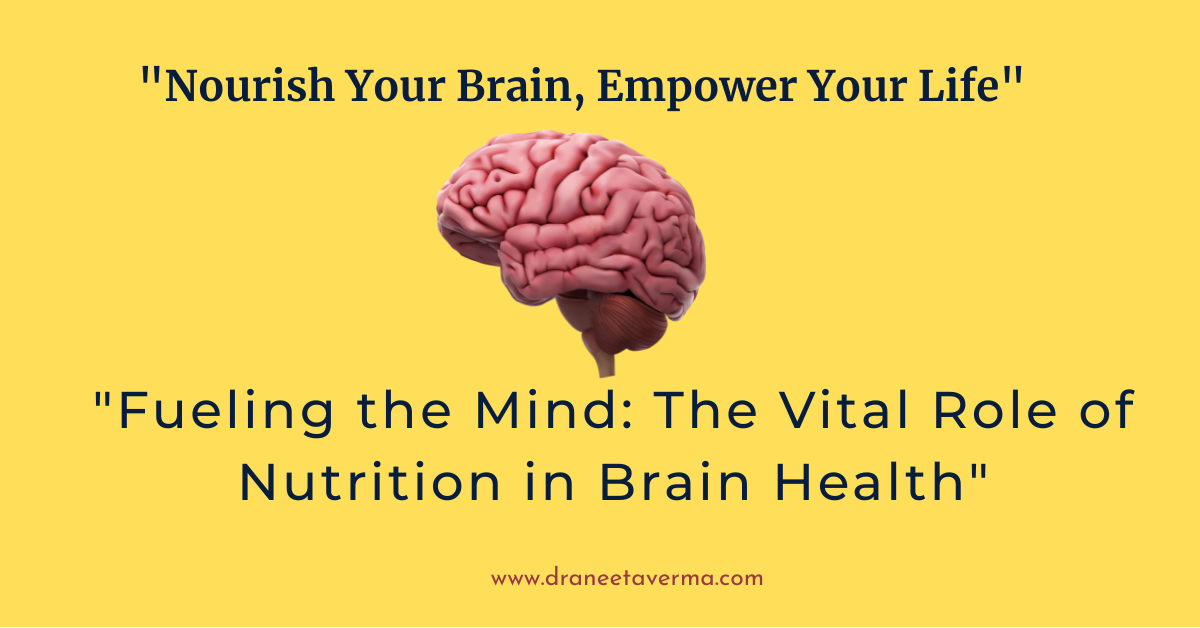+918048051883

This is your website preview.
Currently it only shows your basic business info. Start adding relevant business details such as description, images and products or services to gain your customers attention by using Boost 360 android app / iOS App / web portal.
Nutrition is Essential for Brain Health: Fuelin...

Nutrition is Essential for Brain Health: Fueling the Mind for Optimal Function The brain, the most complex organ in the human body, is the control center for all mental, emotional, and physical activities. From cognition to memory and mood regulation, brain health is crucial for leading a fulfilling life. While mental exercises and good sleep habits are often discussed in relation to brain health, one of the most fundamental aspects often overlooked is nutrition. The nutrients we consume have a direct and profound impact on brain function, influencing everything from mental clarity to emotional stability and even the prevention of cognitive decline. 1. The Role of Nutrition in Brain Function Nutrition plays an essential role in the overall function and structure of the brain. The brain is highly energy-demanding, using up to 20% of the body's total energy, despite accounting for only about 2% of its total weight. This makes it crucial to fuel the brain with the right types of nutrients to maintain its optimal performance. Proper nutrition supports neurotransmitter production, regulates mood, improves focus, and even enhances the brain's plasticity—the ability to form new connections and adapt to new information. The relationship between diet and cognitive function is intricate, with different nutrients supporting specific aspects of brain health. From improving memory to enhancing concentration and decision-making, what we eat can influence how well our brains perform. 2. Brain Energy Demands: The Fuel for Thought The primary fuel for the brain is glucose, a form of sugar derived from carbohydrates. Unlike other organs, the brain relies heavily on a continuous and consistent supply of glucose to function. If glucose levels are unstable, cognitive performance can suffer, leading to problems such as poor focus, fatigue, and irritability. However, it's not just the quantity of glucose that matters but the quality of its source. Diets that provide steady, long-lasting energy are more effective in supporting brain function than those that cause spikes and crashes in blood sugar. This stable glucose supply is vital for maintaining alertness, concentration, and memory over extended periods. 3. Nutrient-Rich Foods and Brain Health Certain nutrients are particularly beneficial for supporting brain health. These nutrients help maintain the structure and function of brain cells, support communication between neurons, and protect the brain from oxidative stress and inflammation. Here are some key nutrients that support cognitive health: 3.1. Healthy Fats The brain is made up of approximately 60% fat, making fat an essential component for maintaining its structure and function. Healthy fats, especially those from plant-based sources, are critical for maintaining the integrity of cell membranes and facilitating communication between neurons. These fats also play an important role in reducing inflammation in the brain, which is associated with cognitive decline and neurological diseases. 3.2. Proteins and Amino Acids Proteins, made up of amino acids, are vital for neurotransmitter production. Neurotransmitters are chemicals that transmit signals in the brain and regulate processes such as mood, memory, and learning. Amino acids derived from proteins play a direct role in the synthesis of neurotransmitters such as serotonin and dopamine, which are essential for maintaining focus, managing stress, and regulating emotions. 3.3. Vitamins and Minerals Vitamins and minerals are fundamental for optimal brain function. For example, B vitamins, particularly folate, B6, and B12, are involved in the production of neurotransmitters and the maintenance of healthy nerve cells. Magnesium, a mineral found in a variety of foods, supports neurotransmitter function, while also helping to maintain calm and prevent anxiety. Antioxidant vitamins, like vitamin E and vitamin C, protect the brain from oxidative stress, a form of damage caused by free radicals. Oxidative stress has been linked to conditions such as Alzheimer’s disease, dementia, and other forms of cognitive decline. 4. The Impact of Chronic Inflammation on Brain Health Chronic inflammation is a major contributor to various neurological conditions, including cognitive decline and mood disorders. Inflammation in the brain can damage neurons, impair neurotransmitter function, and interfere with the brain’s ability to communicate effectively. Fortunately, certain nutrients have anti-inflammatory properties that help protect the brain from this damage. These nutrients support the brain’s defense mechanisms and help to reduce the long-term risk of neurodegenerative diseases like Alzheimer’s and Parkinson’s. 5. Brain Protection and Cognitive Longevity One of the most compelling reasons to focus on nutrition for brain health is its ability to protect against cognitive decline as we age. Several nutrients have been shown to promote brain longevity, preserving cognitive function and improving memory over time. For example, antioxidants help protect the brain from age-related damage caused by free radicals. Healthy fats, such as omega-3 fatty acids, support brain cell membranes and improve communication between neurons, which is essential for memory and cognitive function. By incorporating these nutrients into daily life, individuals may experience better memory, focus, and mental agility as they age. 6. Mental Clarity and Emotional Well-Being In addition to supporting cognitive function, proper nutrition plays a significant role in emotional health. The balance of certain nutrients can help regulate mood, reduce feelings of stress and anxiety, and improve overall mental well-being. Nutrient-rich foods contribute to the production of serotonin, a neurotransmitter that stabilizes mood, and dopamine, which plays a role in pleasure and motivation. A steady supply of these nutrients ensures that the brain functions optimally, improving mental clarity, focus, and emotional stability. 7. Gut Health and the Brain-Gut Connection Emerging research has highlighted the strong connection between gut health and brain function. The gut microbiome—an ecosystem of microorganisms living in the digestive tract—plays a significant role in influencing brain health, mood, and cognitive performance. A balanced microbiome supports the production of neurotransmitters and helps to maintain a healthy mental state. By consuming gut-friendly foods, individuals can enhance brain function, improve memory, and support mental clarity. Fiber-rich foods, probiotics, and prebiotics promote a healthy gut microbiome, which in turn supports brain health. 8. The Impact of Hydration on Brain Health Dehydration can severely impair brain function. Even mild dehydration can lead to difficulties with concentration, memory retention, and mood regulation. The brain is composed largely of water, and maintaining proper hydration is essential for optimal brain function. Drinking adequate amounts of water throughout the day helps ensure that the brain receives the hydration it needs to stay sharp and focused. Proper hydration also supports cognitive performance and enhances mental clarity. Nutrition is essential for maintaining brain health, optimizing cognitive function, and preventing mental health disorders. The foods we eat provide the building blocks for neurotransmitters, support brain cell structure, and protect against oxidative damage and inflammation. By focusing on a balanced and nutrient-dense diet, we can ensure that our brains are fueled for optimal performance throughout our lives. As research continues to uncover the intricate relationships between food, the brain, and mental well-being, it becomes increasingly clear that nourishing the brain is as important as nourishing the body for long-term health and vitality.

